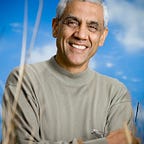We Need Large Innovations
Section 1 of “Reinventing Societal Infrastructure with Technology” which will be release end of January. I will be posting a new section daily. Please share your feedback as this is a work in progress.
“What can be imagined technologically can be invented” is more true than not. Technology has always shaped the human world and currently it is disrupting the way people work, live, and associate by providing radically new tools. New technologies are rewriting human aspirations. Innovations in the areas of clean energy, food technology, digitization, robotics, artificial intelligence, 3D-printing, transportation have the potential to prevent climate change, achieve food abundance, reshape cities, knit humanity, and enhance human capability exponentially. But the future, as William Gibson wrote, isn’t evenly distributed. Some areas are making rapid progress while others need turbocharging!
Entrepreneurs are leveraging technology to reinvent the big needs in society, food, health, housing, transportation, financial services, entertainment, and more in a more democratic and accessible way though here again broad accessibility needs more turbocharging. The mechanism of invention by the “drivers of reinvention” mostly capitalism and entrepreneurship, tends to focus the drivers on shorter term profit maximization (as it should be for them to survive and flourish) rather than societal good maximization, generally. The power of ideas driven often by technology and entrepreneurial energy are laying by the wayside institutional views about society’s providers. What seems most exciting is that many of society’s GDP and business-related needs are being reinvented everyday, and all that is done in a very innovative and non-institutional way.
Non-institutional reinvention is a powerful means of increasing innovation and eventually accessibility. It all comes down to the fact institutions look back on the past to predict the future, instead of reinventing the futures the way entrepreneurs are able to. Such approach, perhaps optimistically, may provide us resources and time to address other pressing societal need, such as socio-emotional or environmental.
Approximately seven hundred million people have the resource rich lifestyle (environment rich, energy rich, housing rich, health care rich, education rich, food rich ) that seven billion people on this planet want. Technology, innovation and invention are necessary, even if not sufficient by themselves, to make this happen. And what we really need are dreamers that can imagine the impossible and make it happen. Instead of being pragmatic, such people ask “why not?” and with their entrepreneurial energy try and make these dreams come true.
What comes next for reinvention? Public transportation? Construction? Buildings? Healthcare? Food? Cities? Communications? Companionship? Elder care? Space? Financial system? What entrepreneurs do is they imagine what feels impossible to most people, and take it all the way from impossible, to improbable, to possible but unlikely, to plausible, to probable, to real!
The key is individual entrepreneurs and their passion for a vision and no matter how ludicrous their idea might seem, they give the improbable a shot. Of course, one needs tons of good luck, and many, probably most, of these attempts will fail. The press and other critics will have a field day and denigrate them for hubris, arrogance, fraud, naivety, and worse. However, it is these improbable attempts that will, when they occasionally squeak by the “wall of existing reality and institutional noise,” change the world for the better (hopefully mostly for good, though not without some collateral damage or consequences).
Looking back in twenty years the pundits, reports, studies, consultants will be largely wrong about the future of societal changes. I shiver every time I see a UN Report, a McKinsey report, an econometric projection going beyond the span of five years, especially coming from those pundits who have never done much themselves except pontificate… The future is not knowable, but it is inevitable and inventable so we need great entrepreneurs and technologists to invent the future.
